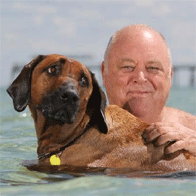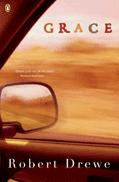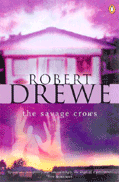Robert Drewe – March 8 2020
 Robert is an author, playwright and editor. As a journalist he won two Walkley Awards before taking up writing fiction. Robert’s short story collections include The Bodysurfers, adapted for radio and theatre and as a TV mini-series, The Bay of Contented Men, The Rip and The True Colour of the Sea. His memoirs include The Local Wildlife, told in short stories, The Shark Net, adapted as a TV mini-series and radio drama, and Montebello, about his visit to the site of the British atom bomb testing. His novels include A Cry in the Jungle Bar, Fortune, Our Sunshine, which was made into the film Ned Kelly, The Drowner and Whip Bird. Robert’s non-fiction works include Walking Ella, Swimming to the Moon and The Beach. He has written two plays, The Bodysurfer: The Play and South American Barbecue and has edited two short-story anthologies, The Penguin Book of the Beach and The Penguin Book of the City, as well as Best Australian Stories 2006 and 2007, and Best Australian Essays 2010. Awarded a special Australian Artists’ Creative Fellowship by then Prime Minister, Paul Keating, Robert has also received an honorary doctorate in literature from the University of Queensland, and an honorary doctorate of letters from the University of Western Australia. He has lived and worked in San Francisco and London and been writer-in-residence at the University of Western Australia, LaTrobe University in Melbourne, the South Bank Centre at Royal Festival Hall, London, and at Brixton Prison in London.
Robert is an author, playwright and editor. As a journalist he won two Walkley Awards before taking up writing fiction. Robert’s short story collections include The Bodysurfers, adapted for radio and theatre and as a TV mini-series, The Bay of Contented Men, The Rip and The True Colour of the Sea. His memoirs include The Local Wildlife, told in short stories, The Shark Net, adapted as a TV mini-series and radio drama, and Montebello, about his visit to the site of the British atom bomb testing. His novels include A Cry in the Jungle Bar, Fortune, Our Sunshine, which was made into the film Ned Kelly, The Drowner and Whip Bird. Robert’s non-fiction works include Walking Ella, Swimming to the Moon and The Beach. He has written two plays, The Bodysurfer: The Play and South American Barbecue and has edited two short-story anthologies, The Penguin Book of the Beach and The Penguin Book of the City, as well as Best Australian Stories 2006 and 2007, and Best Australian Essays 2010. Awarded a special Australian Artists’ Creative Fellowship by then Prime Minister, Paul Keating, Robert has also received an honorary doctorate in literature from the University of Queensland, and an honorary doctorate of letters from the University of Western Australia. He has lived and worked in San Francisco and London and been writer-in-residence at the University of Western Australia, LaTrobe University in Melbourne, the South Bank Centre at Royal Festival Hall, London, and at Brixton Prison in London.
 Grace
Grace
Penguin, 2006; ISBN 9780143005322
Apart from being named after a 100,000-year-old skeleton, Grace Malloy was 29 and for much of the past three years she’d been hiding from an erotomaniac. Physically and emotionally besieged, Grace attempts to claw back her personal territory by abandoning her inner-city life as a film reviewer and fleeing to the remoteness of the Kimberley – where existence and territory have altogether wider implications. Lying low, working in a wildlife park, she slowly reclaims her sanity. Her only links to the outside world are her father and her stalker. Intricately plotted, breathlessly paced, Grace reflects on the countless varieties of love and the nature of fear. At once intimate and grand in scale, this disquieting and provocatively witty novel reveals the full vigour of an artistic vision in turn poetic and cinematic.
 The Savage Crows
The Savage Crows
Penguin, 2001; ISBN 9780141007991
[First published by Collins, 1976]
This revelatory story of the most tragic, cruel, brave and misguided episode in Australia’s history – the ‘saving’ of a unique race, the Tasmanian Aborigines – is seen through the eyes of an obsessive young present-day narrator. Breathtaking and visionary in its scope, The Savage Crows breaks new fictional ground in its affecting portrayal of the collision of worlds, generations and mythologies. From suburban apathy and cynicism blossoms a wild, foolhardy and beautiful hinterland of time and space.
